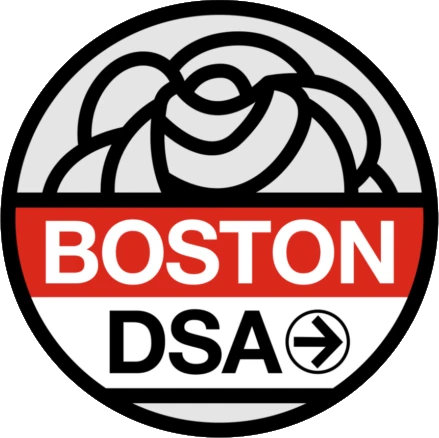

BUGWU Grads Hold May Day Rally as Bargaining Continues
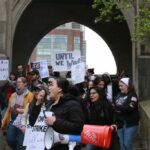
[[{“value”:”
By Vanessa Bartlett
On Wednesday, an estimated 2000 people participated in a May Day rally with the Boston University Graduate Workers Union (BUGWU) to demand that the university provide serious responses to their contract proposals. But in a bargaining session the following day, the university continued to stall, despite some progress in the previous session.
Rally participants begin marching from Marsh Plaza towards Bay State Road
As the spring semester winds down, the university has been flailing to make up for the absence of grad students in classrooms. In an email sent to undergraduates on April 29, interim Provost Kenneth Lutchen assured students that the school remains “focused on supporting students affected by the strike.”
Joe Guidry, a third-year PhD student in the Astronomy department and member of BUGWU’s bargaining committee, took issue with the idea that keeping grad workers out of the classroom is in the best interest of undergraduate students.
“It’s clear that this university is run by and for the admins and the donors. There is no sense of faculty governance, there’s certainly no sense of democratic agency for the grad workers, or even the undergrads for that matter,” Guidry said. 21,000 undergrads enrolled at BU have had their education disrupted by the strike this semester, and the university is unwilling to meet even basic demands of the graduate workers, leaving no room for the possibility of the union returning to work in their critical capacities as researchers and teachers.
At the May Day rally, speakers from BUGWU made it clear that they believe their fight is an existential one, which goes beyond pay and benefits, and cuts to the heart of the type of institution BU could be.
“Our strike is working because it is revealing that BU is run by admins like a real estate company that owns a diploma mill, churning out expensive degrees by any means necessary,” Jaira Koh, a BUGWU member, said to the crowd at Marsh Plaza.
Koh continued, “Every single experience that we’ve had at BU of an actual educational and research institution is the result of brave, caring people outright defying the vision of the administration, and instead carving out small pockets of what the university could be. I’m talking about us. Grads, undergrads, staff and faculty. We are the only reason that this place still feels like it might be worth fighting for.”
This graph from the union shows the stark difference in bargaining participation between BUGWU and the university.
Guidry explained, “It’s about building a better BU. It’s about making this our university, run by us and for us, run for the people of this university in education, over profit and prestige.”
In his email to undergraduate students, interim provost Freeman boasted about a recent bargaining session where the University and BUGWU reached tentative agreements on six articles. However, Guidry said that in their most recent bargaining session, the university came to the table unprepared and unwilling to TA any more proposals.
“I believe this is a calculated response,” Guidry confided. “The university does not want to show signs of panic. After the incredible show of force that grad workers, undergrads, faculty and staff demonstrated at our May Day Rally yesterday, I think the university is putting on a brave face and trying to pretend that they are not worried about the looming disruption that will happen over the final grading period.”
“I think it’s very clear our strike is working. And I think it’s manifest in how management is behaving. Both at the bargaining table and their correspondence,” said Guidry.
“On strike: until we WIN!” and “BU works: because WE DO” were some of the chants that rang out across campus on May Day.
In his email to undergraduates, Lutchen attempted to thread a narrative of division between undergraduates whose educational experience was interrupted by grad strikes, and BU faculty who were put under pressure to find alternative ways of teaching without aid of graduate students.
“We want to address head-on BUGWU’s allegations that we are not providing an appropriate and robust educational experience to our students during this time. In the early period of the strike, many faculty and staff went above and beyond to pivot in record time to provide a quality educational experience to the students who were affected by BUGWU’s job action,” Lutchen wrote.
Apart from calling a five-week-long strike a “job action,” terminology so vague and sanitized as to be completely misleading, and referring to BUGWU’s pointed and justified criticisms of the university’s bargaining strategy as “misinformation” in other parts of the email, Lutchen’s implication of the unpopularity of BUGWU’s position was severely undercut by the massive outpouring of support received by graduate workers at Wednesday’s rally.
Dhruv Kapadia, BU’s undergraduate student body president, spoke at the rally about the importance of solidarity across the BU community. “Undergraduates, graduate students, staff, faculty and alumni are all connected by one shared BU identity,” said Kapadia. “Without solidarity, we are nothing.”
A statue of BU’s mascot, Rhett the Boston Terrier, watched as the crowd marched past towards One Silber Way
BUGWU and Palestine
The BUGWU strike is happening concurrently with a wave of repression of student expression at universities across the country and in Boston, where over 200 students and community members have been arrested at university encampments. Students who speak up for the rights of Palestinians who have been subject to displacement and genocide at the hands of the U.S.-backed Israeli occupation, are in turn facing increasing police repression and violence, sanctioned by their own universities.
These students peacefully demand that their universities disclose their financial ties to the Israeli apartheid government and divest from them, and are met with police in riot gear. In much the same way, unions within higher education institutions find themselves on the front lines of a class struggle, between the ruling elites who govern universities and the working-class people responsible for the day-to-day operations of those schools.
Guidry added, “Our struggle for control over this university can be seen across the country… our struggles as grad workers are not equal to the Palestinians who await imminent invasion and Rafah and elsewhere in the occupied Gaza Strip, but they clearly are interconnected. And that is why we put out our statement of solidarity [with Palestine].”
Ruofei, an undergraduate in the Anthropology department at BU and longtime leader in BU’s Students for Justice in Palestine group, spoke at the rally as well. “Our struggle is rooted in Gaza, where the Zionist entity is still massacring families and starving a besieged population.”
“The experience of suppression of our voices and disregard of our rights to free speech is a struggle that we share with the graduate workers of BU. Graduate workers have been silenced and intimidated by the administration at BU,” said Ruofei.
BUGWU’s May Day rally was confirmation that the union is dedicated to the long-term struggle, and determined to win no matter how long it takes. According to the union, 93% of BUGWU members are rent-burdened. Many utilize food pantries and other services just to be able to eat. Parents are left to figure out for themselves how to pay for childcare.
Confronted with the seriousness of these concerns, BU has tried to project an image of strength and disinterest for months. However, undergraduates and faculty continue to vocally support graduate workers through their contract fight. That unwavering community support was on display Wednesday, when five weeks into their strike, BUGWU held their biggest rally yet.
“This is really a tug of war. It is a class struggle. And we’re seeing that with our strike, we are tugging harder than them. Our strike is working. We are strong. They are the ones who can make this tug of war end sooner. We are resolved around our demands, and we have the power to win them,” said Guidry.
Grads march past a banner on Bay State Road which reads, “We are the ones we have been waiting for.” “}]]
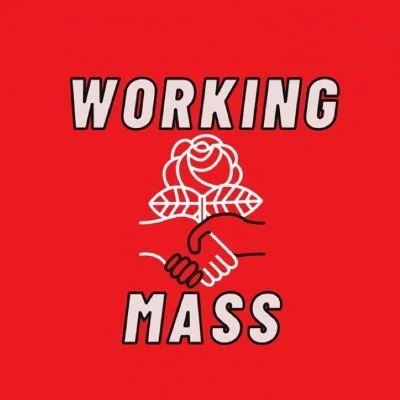
BUGWU Grads Hold May Day Rally as Bargaining Continues
By Vanessa Bartlett
On Wednesday, an estimated 2000 people participated in a May Day rally with the Boston University Graduate Workers Union (BUGWU) to demand that the university provide serious responses to their contract proposals. But in a bargaining session the following day, the university continued to stall, despite some progress in the previous session.

As the spring semester winds down, the university has been flailing to make up for the absence of grad students in classrooms. In an email sent to undergraduates on April 29, interim Provost Kenneth Lutchen assured students that the school remains “focused on supporting students affected by the strike.”
Joe Guidry, a third-year PhD student in the Astronomy department and member of BUGWU’s bargaining committee, took issue with the idea that keeping grad workers out of the classroom is in the best interest of undergraduate students.
“It’s clear that this university is run by and for the admins and the donors. There is no sense of faculty governance, there’s certainly no sense of democratic agency for the grad workers, or even the undergrads for that matter,” Guidry said. 21,000 undergrads enrolled at BU have had their education disrupted by the strike this semester, and the university is unwilling to meet even basic demands of the graduate workers, leaving no room for the possibility of the union returning to work in their critical capacities as researchers and teachers.
At the May Day rally, speakers from BUGWU made it clear that they believe their fight is an existential one, which goes beyond pay and benefits, and cuts to the heart of the type of institution BU could be.
“Our strike is working because it is revealing that BU is run by admins like a real estate company that owns a diploma mill, churning out expensive degrees by any means necessary,” Jaira Koh, a BUGWU member, said to the crowd at Marsh Plaza.
Koh continued, “Every single experience that we’ve had at BU of an actual educational and research institution is the result of brave, caring people outright defying the vision of the administration, and instead carving out small pockets of what the university could be. I’m talking about us. Grads, undergrads, staff and faculty. We are the only reason that this place still feels like it might be worth fighting for.”

Guidry explained, “It’s about building a better BU. It’s about making this our university, run by us and for us, run for the people of this university in education, over profit and prestige.”
In his email to undergraduate students, interim provost Freeman boasted about a recent bargaining session where the University and BUGWU reached tentative agreements on six articles. However, Guidry said that in their most recent bargaining session, the university came to the table unprepared and unwilling to TA any more proposals.
“I believe this is a calculated response,” Guidry confided. “The university does not want to show signs of panic. After the incredible show of force that grad workers, undergrads, faculty and staff demonstrated at our May Day Rally yesterday, I think the university is putting on a brave face and trying to pretend that they are not worried about the looming disruption that will happen over the final grading period.”
“I think it’s very clear our strike is working. And I think it’s manifest in how management is behaving. Both at the bargaining table and their correspondence,” said Guidry.

In his email to undergraduates, Lutchen attempted to thread a narrative of division between undergraduates whose educational experience was interrupted by grad strikes, and BU faculty who were put under pressure to find alternative ways of teaching without aid of graduate students.
“We want to address head-on BUGWU’s allegations that we are not providing an appropriate and robust educational experience to our students during this time. In the early period of the strike, many faculty and staff went above and beyond to pivot in record time to provide a quality educational experience to the students who were affected by BUGWU’s job action,” Lutchen wrote.
Apart from calling a five-week-long strike a “job action,” terminology so vague and sanitized as to be completely misleading, and referring to BUGWU’s pointed and justified criticisms of the university’s bargaining strategy as “misinformation” in other parts of the email, Lutchen’s implication of the unpopularity of BUGWU’s position was severely undercut by the massive outpouring of support received by graduate workers at Wednesday’s rally.
Dhruv Kapadia, BU’s undergraduate student body president, spoke at the rally about the importance of solidarity across the BU community. “Undergraduates, graduate students, staff, faculty and alumni are all connected by one shared BU identity,” said Kapadia. “Without solidarity, we are nothing.”

BUGWU and Palestine
The BUGWU strike is happening concurrently with a wave of repression of student expression at universities across the country and in Boston, where over 200 students and community members have been arrested at university encampments. Students who speak up for the rights of Palestinians who have been subject to displacement and genocide at the hands of the U.S.-backed Israeli occupation, are in turn facing increasing police repression and violence, sanctioned by their own universities.
These students peacefully demand that their universities disclose their financial ties to the Israeli apartheid government and divest from them, and are met with police in riot gear. In much the same way, unions within higher education institutions find themselves on the front lines of a class struggle, between the ruling elites who govern universities and the working-class people responsible for the day-to-day operations of those schools.
Guidry added, “Our struggle for control over this university can be seen across the country… our struggles as grad workers are not equal to the Palestinians who await imminent invasion and Rafah and elsewhere in the occupied Gaza Strip, but they clearly are interconnected. And that is why we put out our statement of solidarity [with Palestine].”
Ruofei, an undergraduate in the Anthropology department at BU and longtime leader in BU’s Students for Justice in Palestine group, spoke at the rally as well. “Our struggle is rooted in Gaza, where the Zionist entity is still massacring families and starving a besieged population.”
“The experience of suppression of our voices and disregard of our rights to free speech is a struggle that we share with the graduate workers of BU. Graduate workers have been silenced and intimidated by the administration at BU,” said Ruofei.
Ready for the long haul
BUGWU’s May Day rally was confirmation that the union is dedicated to the long-term struggle, and determined to win no matter how long it takes. According to the union, 93% of BUGWU members are rent-burdened. Many utilize food pantries and other services just to be able to eat. Parents are left to figure out for themselves how to pay for childcare.
Confronted with the seriousness of these concerns, BU has tried to project an image of strength and disinterest for months. However, undergraduates and faculty continue to vocally support graduate workers through their contract fight. That unwavering community support was on display Wednesday, when five weeks into their strike, BUGWU held their biggest rally yet.
“This is really a tug of war. It is a class struggle. And we’re seeing that with our strike, we are tugging harder than them. Our strike is working. We are strong. They are the ones who can make this tug of war end sooner. We are resolved around our demands, and we have the power to win them,” said Guidry.



The Socialist Case for TOPA
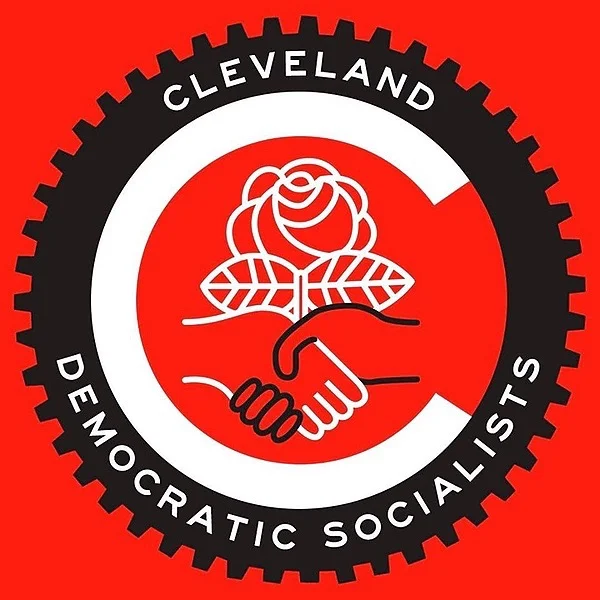

Anti-Zionists have a right to speak – Cle DSA Statement Against HR 6090
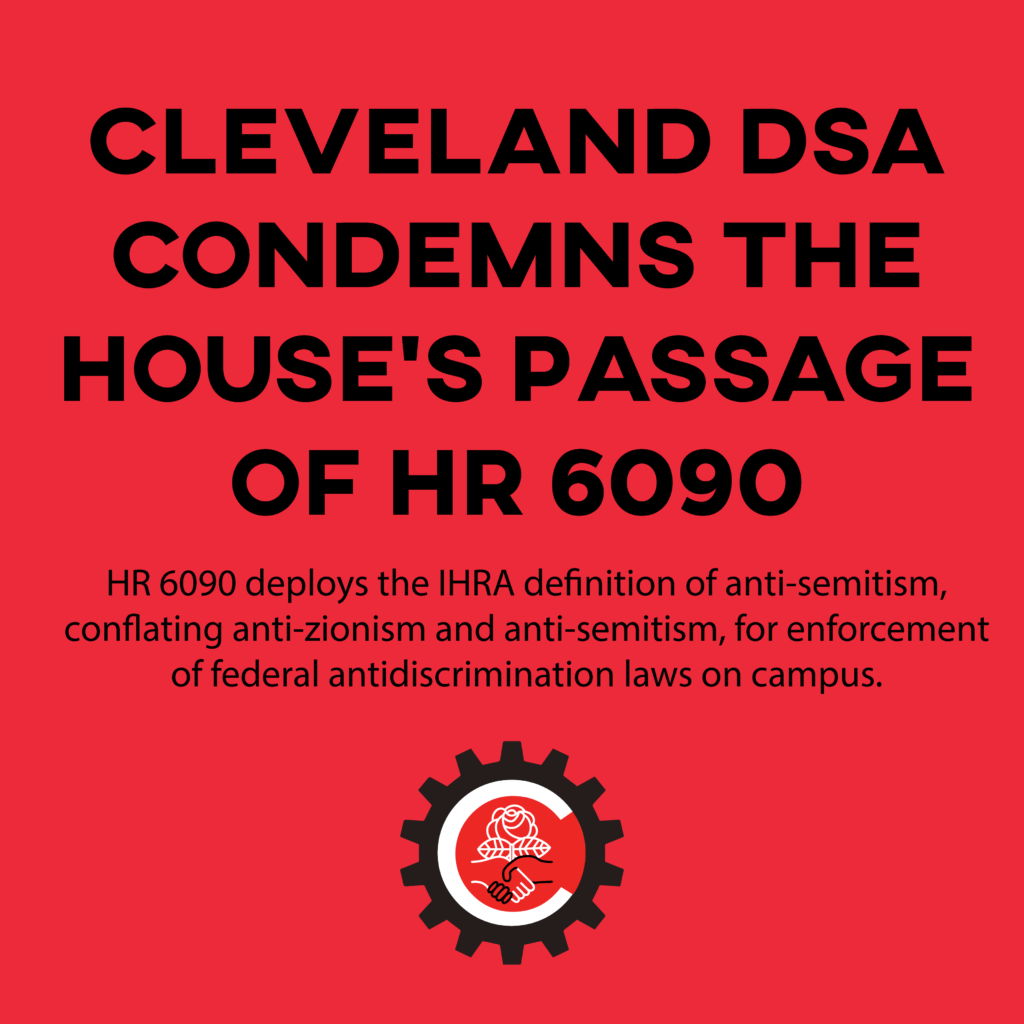
Cleveland DSA condemns the House’s passage of HR 6090, which deploys the IHRA definition of anti-semitism, conflating anti-zionism and anti-semitism, for enforcement of federal antidiscrimination laws on campus. Republicans introduced this legislation in a desperate assault on the youth protests that have erupted across America as a result of American universities’ bizarre, large scale investments in Israel. A hundred and thirty-three Democrats voted for this bill, with Cleveland’s Shontel Brown among the co-sponsors.
Cosponsor Richie Torres claims the bill doesn’t limit criticism of Israel’s policies except when people call for the destruction of Israel. In other words, one can legally favor one Zionist policy over another, but there will be only one lawful opinion on the apartheid regime itself. Legislators are well aware that those who support democratic rights for Palestinians across historic Palestine, regardless of the model proposed, are considered to be calling for Israel’s “destruction”. They know the IHRA holds that describing Zionist colonialism as racist is, by itself, antisemitism. They themselves join in widespread and willful misinterpretation of protest slogans as antisemitic. Why the First Amendment should have an exception carved out for Israel is not clear, but there is no question of how this law will be used on campuses across the United States.
There is a good reason Israel and its allies have, for decades, worked hard to cancel, vilify, and suppress Palestinian speakers and their allies, especially on campus. They know that there is no justification for settler colonialism, massacres, torture, police kidnapping, and general exploitation of Palestinians. Reflecting on the campus protests, Israeli Minister Nir Barkat recently stated that “American public opinion is an existential threat to Israel.” Mr. Barkat’s allies in Congress say it is necessary to ban certain opinions on Israel to prevent their gaining a foothold in the United States. This is a doomed effort, already a substantial minority of Americans, including large portions of America’s Jewish community, are openly expressing anti-zionist views, a situation that was unthinkable even 10 years ago.
Passing anti speech legislation to shield genocide supporters, a supposed anti-discrimination measure from the same party systematically attacking trans youth at school, is an insult to young voters. Under Trump, there is no question that the organizations criminalized today, with Democrat connivance, will be on the front lines against GOP repression. Laws like HR 6090, among countless other bipartisan measures of state-surveillance and repression, will be deployed against us by Trump. We will use our front line role in the battle for democracy to further educate the American public about Israel, whether or not the attorney general or the supreme court consider this lawful.
There is a widespread fear that Biden cannot secure enough young and Arab-American votes to defeat Trump, particularly here in the midwest. Democrats have been trying, hopelessly, to play both sides, to both criticize and supply Netanyahu’s genocide, and it is destroying their party. Should Biden decline to veto the bill, this would represent yet another step towards a second Trump term, a step taken not by students, nor outside agitators, neither by antizionist Jews, nor Arab America, but by the candidate who asks for our vote. It is in this desperate context that the GOP and the large majority of House Democrats are asking Joe Biden and their Senate colleagues to spit on the first and most fundamental right of Americans.
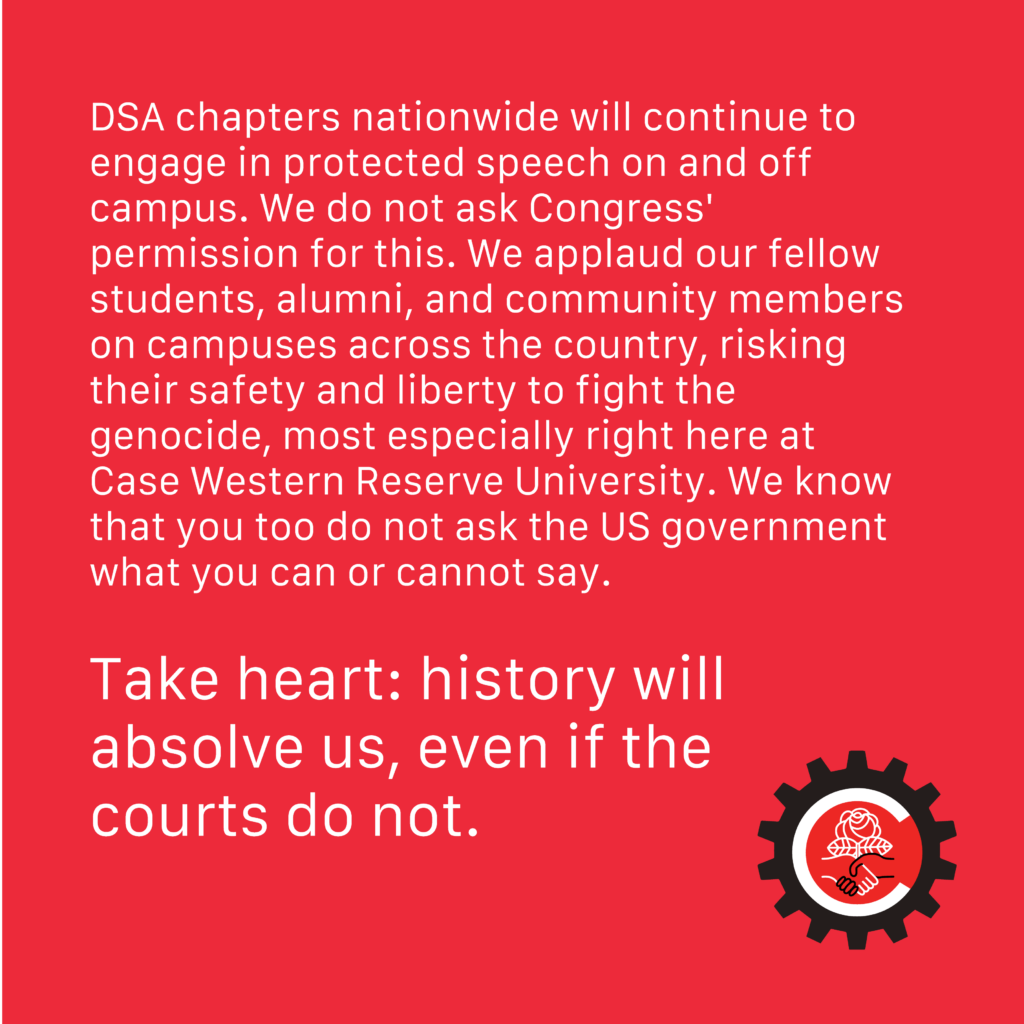
Our congresspeople were among the 91 to vote against the bill. Socialists must do likewise even when they are alone. Elected socialists must maintain a clear and accurate message regarding the occupation of Palestine. We urge our representatives and our sister chapters to comply with the spirit of the 2023 National Convention, which specifically resolved to expect electeds and prospective endorsees to reject the IHRA definition.
DSA chapters nationwide will continue to engage in protected speech on and off campus. We do not ask Congress’ permission for this. We applaud our fellow students, alumni, and community members on campuses across the country, risking their safety and liberty to fight the genocide, most especially right here at Case Western Reserve University. We know that you too do not ask the US government what you can or cannot say. Take heart: history will absolve us, even if the courts do not.
The post Anti-Zionists have a right to speak – Cle DSA Statement Against HR 6090 appeared first on Democratic Socialists of America.


Letter from a member of Case Western’s Jewish Community
The below is a response to President Kaler’s email threatening disciplinary and legal action against students for their Gaza solidarity assembly at CWRU

Hello President Kaler et al.,
As a member of the CWRU and the Cleveland Jewish community, I am deeply disturbed by the rhetoric of this email which implies that there is rampant anti-Semitism at the protests and on our campus. Members of my Jewish communities have been standing in solidarity with the people of Palestine long before October 7. It is my duty as a person of the Jewish faith to employ our values of tikun olam (repairing the world) and pikuach nefesh (saving and valuing all lives). This includes but is not limited to being in solidarity with my Palestinian siblings in our community. For the past 7 months, they’ve watched in horror as their family members and loved ones abroad in Gaza face forced displacement, forced starvation, and extreme violence that we are priveleged enough to never be able to fully comprehend.
Our brave students are risking everything to stand up for these Jewish values of repairing the world and saving all lives. As a Jewish person, I am not afraid, I don’t feel unsafe, and I am not intimidated by seeing community members of all faiths (again, including the members of the Jewish community) come together for interfaith prayer, dialogue, study, and wellness activities. In fact, I think what we are witnessing is a beautiful display of students living out our CWRU mission of the “promotion of an inclusive culture of global citizenship.”
To reiterate, I am not threatened by the students singing, practicing yoga, praying, and gathering for meals together. What I am afraid of, however, is the increased surveillance and policing measures we are seeing all across campus. Acts of surveillance only seek to antagonize our students who are peacefully exercising their right to protest our institution’s silence and complicity in the horrors we are witnessing from afar.
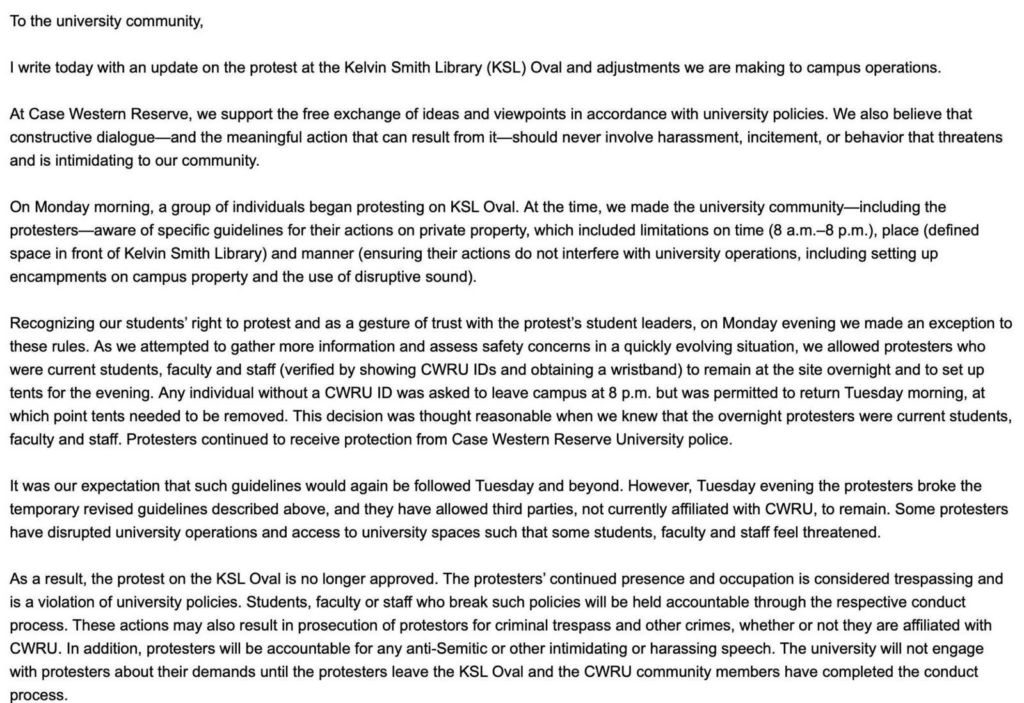
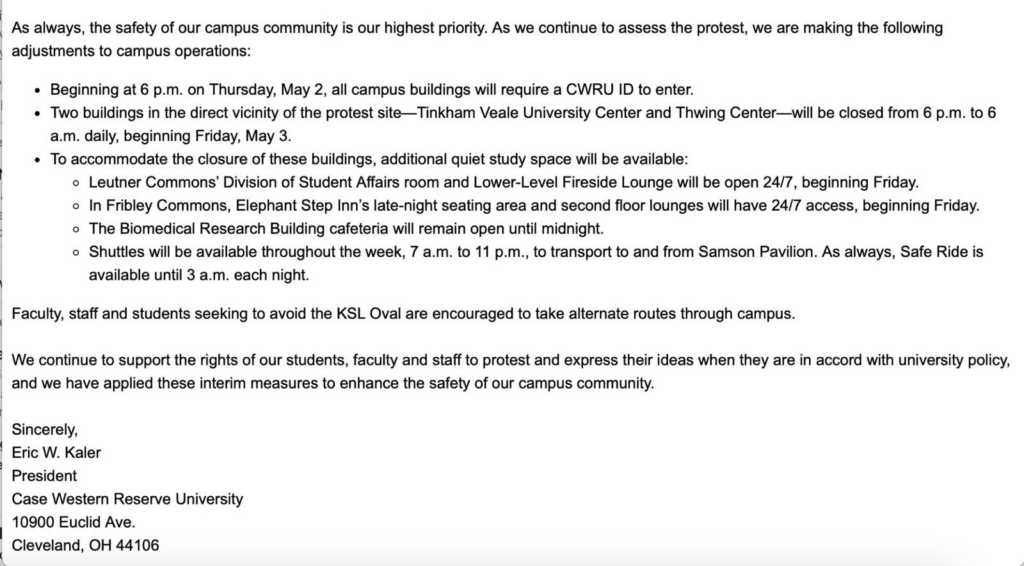
President Kaler’s email regarding the student protests, sent on 5/2/2024 to intimidate the camp and slander its participants.
——————–
We urge you to write your own response to the administration’s attacks against student organizers and their supporters:
Provost’s Office: [email protected]
Presidents Office: [email protected]
Office of Student Affairs: [email protected]
The post Letter from a member of Case Western’s Jewish Community appeared first on Democratic Socialists of America.
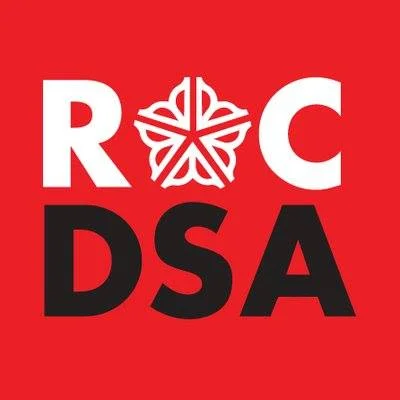
Transparency & The Reservoir
by Jean Allen
I remember a conversation I had with Mary Lupien five years ago at a coffee shop. We’d run into each other and were talking about some local Rochester controversy at the time, when another person with us expressed amazement that we even knew anything about what was going on in the city. That week another friend complained about their kids’ experience with the schools, the decay of Rochester’s infrastructure, and the state of downtown, yet expressed astonishment that I had any contempt for the mayor, who they thought was doing a great job.
Our city has a transparency problem. While we have several amazing projects by movement journalists, broadly our news media avoids controversial topics, focusing on journalistic work which advertises this city as a good place to drive to. What that leads to is a shockingly petty and personalistic political space, where politics is often a matter of loyalty or disdain for particular political figures, rather than anything substantial. It also leads to the vast majority of the people in this city not understanding that the issues they face are political issues which they can change. The image we basically get is of a city where nothing happens, or at least nothing that any one person can affect.
Last month, we were all given notice that our water was potentially unsafe to drink after a body had been found in the reservoir. We were given a boil water notice for half a week before we were notified that the body of Abdullahi Muya (a resident who had been missing since February 18th) had actually been in the reservoir for over a month without the knowledge of the city. The boil water notice was retracted and we went back to going about our day.
Now, the whole reason we have a water treatment process is to make sure that an incident like this does not fully contaminate our water supply, and there’s no reason for conspiratorial levels of alarm. But this event should give people pause about the governance of this city.
Generally, I think people accept that they have no clue what happens in the halls of power because they assume those people have our best interests at heart and are doing a good job for it. But when someone has been found dead in the reservoir for a month, the fact that we can only discover key information about this city’s governance via hearsay and rumor is a further slap in the face. The people of Rochester deserve to know what is happening in our city. ★
Editor’s Note – Check out Red Star’s coverage of a previous transparency gap involving our water supply, ‘We Keep Us Safe When the City Fails,’ by Skye K, from February 2023, available at: rocdsa.org/blog/we-keep-us-safe-when-the-city-fails.
The post Transparency & The Reservoir first appeared on Rochester Red Star.


Dennis Serrette: Presenté
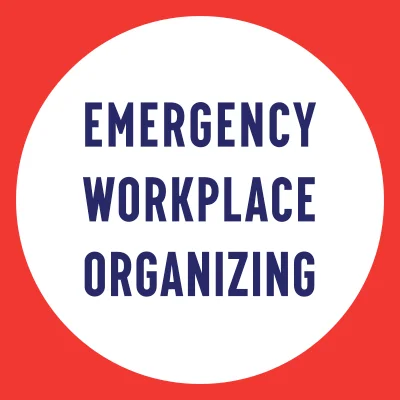

Labor Law as a Shield
It can be a mistake to treat organizing as a fundamentally legal struggle. Here's how to use labor law as a smart organizer.
The post Labor Law as a Shield appeared first on EWOC.
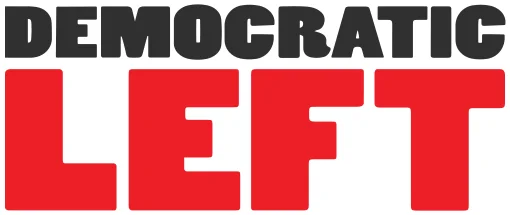

Putting Palestine on the Ballot: An Interview with Uncommitted New Jersey Organizers
In New Jersey, which has one of the highest Muslim populations of any state in the country, DSA has taken the lead on challenging Joe Biden in the June 4 Democratic primary, organizing an slate of uncommitted delegates that will appear on the ballot under the slogan “Justice for Palestine, Permanent Ceasefire Now.” Unlike most states, voters will vote directly for a slate of delegates, meaning that New Jersey DSA will also have a shot at sending socialists and Palestine solidarity organizers to the Democratic National Convention to continue the fight in Chicago.
Annie West of River Valley DSA spoke with Suraj Patel and Fatima Mughal, two Central New Jersey DSA members and Vote Uncommitted New Jersey organizers, to learn about the fight for Palestine at the ballot box and their struggle against the Democratic Party.
Annie: Can you tell us the story of Vote Uncommitted New Jersey from the beginning?
Suraj: After seeing the results in Michigan, many of us were blown away by the vote and excited about the possibilities in our state. After doing some research, we figured out we were running on some very tight deadlines. Unlike many states, there is no automatic “uncommitted” option in the [New Jersey] primary. Instead, we needed to petition to make the ballot. We had about 5 days to find delegates to apply to run, followed by less than 3 weeks to collect 100 signatures from registered Democrats in each of New Jersey’s 20 delegate districts. Amazingly, we ran over 50 delegates, collected over 3,600 signatures and made the ballot in New Jersey! Our slates will also appear on the ballot with the slogan “Justice For Palestine, Permanent Ceasefire Now,” meaning there is no ambiguity about what our campaign is about.
We never would’ve been able to get there without close collaboration between all three New Jersey DSA chapters. We started being more intentional about working together across the state in our labor work, fundraising for Labor Notes together, and collaborating on strike solidarity during the Rutgers University strike and the Robert Wood Johnson nurses strike. Many of our chapter leaders got to know each other during the DSA National Convention, and those internal relationships were essential in getting the campaign off the ground. But ultimately, what made this campaign work was the incredible dedication of our members from all corners of the state, collecting signatures, pulling all-nighters, calling mosques, tabling, and inspiring each other every day to stand up for Palestine.
Annie: Muslim and Arab communities have played a key role in building Uncommitted campaigns across the country, notably defeating Joe Biden with a 57% vote for Uncommitted in Dearborn, Mich. How have Muslim organizers played a role in New Jersey Uncommitted, and what kind of response have you seen from broader Muslim communities?
Fatima: We have some Muslim comrades, like myself, in our DSA chapters who have helped connect us to the Muslim communities here in NJ through our networks. This campaign started around the start of Ramadan so we were able to connect to many Muslims through visiting mosques. As Muslims, we were able to share the significance of this month and how many Muslims attend evening prayers at their mosques after breaking their fasts. I actually went with my father to some of our local mosques, who helped bring over folks to come learn about the campaign and sign our petitions. It was interesting to see the almost visceral reaction from most people when I asked if they were registered Democrats. Many shared that they had already switched to Independent and most shared their disgust with Biden and the Democrats in general, who have either not commented on what’s happening in Palestine or have straight up voiced support for what Israel is doing, like one of our local representatives, Josh Gottheimer. Once we explained that we too were angry with Biden, and that the Uncommitted vote was a way to send a message directly to him, they were very interested. A few were aware of what had happened in Michigan and were happy that we were working to bring that option to New Jerseyans.
We are still at the initial stages of the campaign, and are also working to build a larger coalition of groups, many of which are local Muslim groups. However, one challenge has been legal hurdles of mosques being 501c3s and unable to endorse or support a political campaign.
Annie: DSA’s For Our Rights platform for the 2024 election states that “relying on the Democratic Party to lead the fight against the Republican Party and the right isn’t working. An independent path, rooted in the working-class majority and building towards an independent workers’ political party, is necessary.” How does the Uncommitted campaign build toward an independent party?
Suraj: From the beginning, we saw this as a campaign aligned with our socialist values. We were under no illusions that we would be trying to “save Biden’s presidency” or change the Democratic party from within. Instead, what we saw was a mass movement of ordinary people disgusted by the ongoing genocide in Palestine and Biden’s unconditional support for Israel. Our role as socialists in this kind of political moment is nothing new—we educate, agitate, and organize. We put forward a sharp and pointed critique of Biden and the capitalist status quo in order to give political coherence and collective voice to this movement, and to fill a void in politics that would otherwise leave people disillusioned and disengaged. As socialists, we tell the truth—that imperialist violence and the daily struggles of capitalism start at the foundations of our political system, and that in order to win a new democratic and socialist society, the working class needs a party of our own.
It’s not enough to just say this though—we need to develop the skills, structures, and membership to contest for power at every level, from organizing apartment buildings and workplaces to winning seats in the halls of Congress. What we are doing in New Jersey, deep community organizing, statewide collaboration, leadership development, I believe is the raw material for a real independent full-throated socialist party, with deep roots in labor, immigrant communities, and the multiracial working class, that can go toe to toe with the Democrats and the Republicans in our state.
Annie: Similarly, it’s old news for socialists that the Democratic Party is not a democracy, often using elaborate bureaucratic machinery to block left-wing candidates and initiatives. What challenges did you face getting on the ballot?
Suraj: New Jersey is one of the most political machine-driven states in the country. Unlike many other states, we had to petition for an uncommitted option by running delegates directly. However, unlike presidential candidates, who need to collect 2,000 signatures statewide to get on the ballot, we had no option to petition at-large. We had to petition by district. This meant we needed to collect signatures all over the state—a higher bar than anyone else on the ballot, and a major early structure test for our campaign. Another strict rule we needed to follow was the Democratic Party’s absurd and likely illegal gender quota which, unbelievably, forced us to disqualify several delegates because we ran too many women!
On March 29, a federal judge ruled New Jersey’s “party line” primary system illegal, and that it must switch to traditional “office block” style ballots used by every other state. The party-line system gave favorable ballot placement, and a major statistical advantage, to candidates endorsed by the county parties, making it much harder for challengers to break through. We welcome the end of this archaic system, but just because the line is gone doesn’t mean the machines have gone away.
We’ve seen party bosses attempt to suppress our campaign even under the new ballot system, by using dirty tricks like minimizing the font size of “uncommitted” on the ballot and refusing to include us in the ballot positioning draw in some counties. We knew we were going to face challenges like this, and we were prepared—starting a grassroots campaign to pressure county clerks, confronting the governor about it on the radio, and using it as a way to agitate against the so-called “Democratic” Party. We’re still in the process of addressing these challenges, but we’ve done our homework and we aren’t about to let the Democrats push Palestine off the ballot.
Annie: All three New Jersey DSA chapters are also embarking on a campaign to expand municipal voting rights to non-citizens, including undocumented residents. How does the Uncommitted campaign relate to non-citizen voting?
Suraj: We absolutely see these issues as interconnected. We’re fighting against an apartheid system in Israel, but here at home immigrants are treated by the state as a subordinate population to be managed. Immigrants are exploited for their labor but don’t enjoy basic political rights, and working class immigrant neighborhoods are regularly brutalized by ICE and police. Unsurprisingly, mainstream Democrats are doing little for noncitizens. In Edison, one of the most diverse towns in the country, we showed up to protest after Democratic mayor [Sam] Joshi made racist comments about migrants, and even used his own immigrant family background to justify it. Democrats across the country who paid lip service to opposing Trump’s draconian immigration policies are now parroting Fox News rhetoric about immigration in a cynical attempt to boost their own careers. Our message in this political climate is clear—only socialists are consistent in fighting for the political freedoms of the entire international working class.
Annie: How can comrades outside New Jersey support the campaign?
Fatima: One especially uplifting aspect of this campaign has been the solidarity and resource sharing that we have received from campaigns in other states, especially organizers from Wisconsin and Michigan. They have met with us to share advice, resources, campaign ideas, and even done media training for our members. Our members have also tried to pay it forward by helping other states that have earlier primaries do phone banking. These campaigns are a lot of work, so we would love to have anyone who is interested reach out to us at [email protected]! We could use help with some of the behind the scenes work, like data collection and input, that can be done from anywhere. We also would love to have more folks following, interacting with, and sharing our social media posts! That will help the campaign grow and reach a wider audience, so please follow us @uncommittednj on Instagram, Twitter, TikTok, and Facebook if you have them!
Annie: What advice do you have for organizers first stepping into DSA-backed campaigns similar to Uncommitted New Jersey?
Fatima: After Michigan’s exciting primary, we had a few members come together to discuss whether we thought it was possible to bring the Uncommitted campaign to NJ. We weren’t sure that we had the expertise and capacity to do it, but we were hopeful and thought that we should at least try! So many of us have been speaking out, attending protests, and bird-dogging politicians, but had felt like it wasn’t getting us anywhere. So when we saw Kamala Harris say the word “ceasefire” the day after the Michigan primary, it gave us hope that the Uncommitted campaign would be another avenue to show our disgust with this administration’s support for the genocide of the Palestinians. While these campaigns do take a lot of time and energy, if you are able to find a passionate and dedicated group of people, it is exciting and uplifting work at a time when many of us are feeling helpless.
In New Jersey, we’ve faced a lot of hurdles trying to navigate the archaic, complicated, and confusing election process, yet we have been able to overcome every single one because of the dedication, creativity, and determination of our comrades. When we first began, we kept saying we were building the plane while flying it, because we really had taken a leap of faith in the work and each other. Our campaign is made up of a diverse group of people across all backgrounds, ethnicities, religions, ages, and gender identities, that was formed because of our desire for an end to this genocide and the liberation of Palestine. I absolutely encourage everyone to bring the campaign to your state! For us, it has brought together an incredible group of comrades that I am constantly in awe of.
The post Putting Palestine on the Ballot: An Interview with Uncommitted New Jersey Organizers appeared first on Democratic Socialists of America (DSA).


May Day Statement
In Houston, we know that we are not alone in our struggle for economic, social, and housing justice. We are not alone in the struggle for liberation from capitalism, colonialism, […]
The post May Day Statement appeared first on Houston DSA.
 :
: 
 Help us demand a fair ballot with a quick, one-minute action!
Help us demand a fair ballot with a quick, one-minute action!